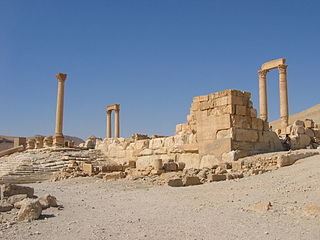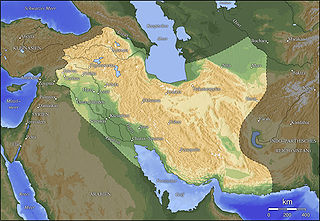Related Research Articles

The Second Triumvirate was an extraordinary commission and magistracy created for Mark Antony, Marcus Aemilius Lepidus, and Octavian to give them practically absolute power. It was formally constituted by law on 27 November 43 BC with a term of five years; it was renewed in 37 BC for another five years before expiring in 32 BC. Constituted by the lex Titia, the triumvirs were given broad powers to make or repeal legislation, issue judicial punishments without due process or right of appeal, and appoint all other magistrates. The triumvirs also split the Roman world into three sets of provinces.
Year 363 BC was a year of the pre-Julian Roman calendar. At the time, it was known as the Year of the Consulship of Aventinensis and Mamercinus. The denomination 363 BC for this year has been used since the early medieval period, when the Anno Domini calendar era became the prevalent method in Europe for naming years.
Publius Cornelius Scipio Nasica Serapio was a Roman politician. He is most well known for mobilising the mob which killed Tiberius Gracchus, who was at the time attempting to stand for re-election as plebeian tribune in 133 BC. He was consul in 138 BC and served as pontifex maximus, from possibly 141 through to his death in 132 BC.
The ovation was a form of the Roman triumph. Ovations were granted when war was not declared between enemies on the level of nations or states; when an enemy was considered basely inferior ; or when the general conflict was resolved with little or no danger to the army itself. The Ovation could also be given rather than a triumph when there were extenuating circumstances, such as when Marcus Marcellus was given an ovation in lieu of a triumph as his army remained in Sicily and therefore was unable to cross the pomerium.

Latin rights were a set of legal rights that were originally granted to the Latins under Roman law in their original territory and therefore in their colonies. "Latinitas" was commonly used by Roman jurists to denote this status. With the Roman expansion in Italy, many settlements and coloniae outside of Latium had Latin rights.

The Panhellenion or Panhellenium was a league of Greek city-states established in the year 131–132 AD by the Roman Emperor Hadrian while he was touring the Roman provinces of Greece.

The Pictones were a Gallic tribe dwelling south of the Loire river, in the modern departments of Vendée, Deux-Sèvres and Vienne, during the Iron Age and Roman period.
Edward Champlin is a Professor of Classics, Cotsen Professor of Humanities, and former Master of Butler College at Princeton University. He teaches Roman history, Roman law, and Latin literature and has written several books regarding these subjects. He is also the co-editor of The Cambridge Ancient History, 2nd edition, volume 10, The Augustan Empire, 43 B.C.–A.D. 69 (1996).
Marcus Fulvius Flaccus was a Roman senator and an ally of the Gracchi. He served as consul in 125 BC and as plebeian tribune in 122 BC.
Gaius Sosius was a Roman general and politician who featured in the wars of the late Republic as a staunch supporter of Mark Antony. Under the latter's patronage he held important state offices and military commands, serving as governor of Syria and leading the expedition to install Herod as king of Judea. Sosius was consul in the year 32 BC, when the Second Triumvirate lapsed and open conflict erupted between the triumvirs Antony and Octavian. Upon taking office, Sosius opposed Octavian in the Senate, for which he was forced to flee Rome.
Mago I, also known as Magon, was the king of the Ancient Carthage from 550 BC to 530 BC and the founding monarch of the Magonid dynasty of Carthage. Mago I was originally a general. Under Mago, Carthage became preeminent among the Phoenician colonies in the western Mediterranean.
Elizabeth Donata Rawson, FBA was a classical scholar known primarily for her work in the intellectual history of the Roman Republic and her biography of Cicero.

The Strata Diocletiana was a fortified road that ran along the eastern desert border, the limes Arabicus, of the Roman Empire. As its name suggests and as it appears on milestones, it was constructed under Emperor Diocletian as part of a wide-ranging fortification drive in the later Roman Empire. The strata was lined with a series of similarly-built rectangular forts situated at one day's march from each other. It began at the southern bank of the river Euphrates and stretched south and west, passing east of Palmyra and Damascus down to northeast Arabia.
Alan Keir Bowman, FBA is a British classicist and academic. He was Camden Professor of Ancient History at the University of Oxford from 2002 to 2010, and Principal of Brasenose College, Oxford, from 2011 to 2015.

The Battle of Carrhae, also known as the Battle of Callinicum, took place in 296 or 297, after the invasion of Mesopotamia and Armenia by the Sasanian king Narseh. The battle took place between Carrhae (Harran) and Callinicum (al-Raqqah) and was a victory for the Sasanians. Narseh attacked with forces recruited from the Euphrates frontier. He managed to defeat his opponent by good timing.
Decimus Valerius Asiaticus was a Roman Senator who served as a Legatus of Gallia Belgica.
Decimus Valerius Taurus Catullus Messallinus Asiaticus was a member of the Arval Brethren who lived in the second half of 1st century and first half of 2nd century.

The ballot laws of the Roman Republic were four laws which introduced the secret ballot to all popular assemblies in the Republic. They were all introduced by tribunes, and consisted of the lex Gabinia tabellaria of 139 BC, applying to the election of magistrates; the lex Cassia tabellaria of 137 BC, applying to juries except in cases of treason; the lex Papiria of 131 BC, applying to the passing of laws; and the lex Caelia of 107 BC, which expanded the lex Cassia to include matters of treason. Prior to the ballot laws, voters announced their votes orally to a teller, essentially making every vote public. The ballot laws curtailed the influence of the aristocratic class and expanded the freedom of choice for voters. Elections became more competitive. In short, the secret ballot made bribery more difficult.

Gaius Antius Restio was a politician of the Roman Republic. He is principally known for the lex Antia sumptuaria, a law against luxury he passed as tribune of the plebs in 68 BC. This law forbade magistrates from attending banquets, in an attempt to contain political corruption. One of the few sources on Restio's life is a poem of his contemporary Catullus, telling that he was an enemy of Publius Sestius, a politician and good friend of Cicero.
The War of Mutina was a civil war between the Roman Senate and Mark Antony in northern Italy. It was the first civil war after the assassination of Julius Caesar. The main issue of the war were attempts by the Senate to resist Antony's forceful assumption of the strategically important provinces of Trans- and Cisalpine Gaul from their governors. The Senate, led by Cicero and the consuls attempted to woo Julius Caesar's heir to fight against Antony. Octavian, however, would pursue his own agenda.
References
- ↑ Debrett's People of Today biography. Unless otherwise noted, Debrett's is the source for biographical data in this article.
- ↑ Classics at Oxford, faculty listing. Archived 2011-07-23 at the Wayback Machine
- ↑ "Cambridge Histories Online". Archived from the original on 24 May 2011. Retrieved 14 October 2010.
- ↑ "Cambridge Histories online". Archived from the original on 24 May 2011. Retrieved 14 October 2010.
- ↑ "CHO summary". Archived from the original on 16 July 2011. Retrieved 14 October 2010.
- ↑ "CHO summary". Archived from the original on 16 July 2011. Retrieved 14 October 2010.
- ↑ "CHO summary". Archived from the original on 16 July 2011. Retrieved 14 October 2010.
- ↑ "CHO summary". Archived from the original on 16 July 2011. Retrieved 14 October 2010.
- ↑ Cambridge University Press online catalogue.
- ↑ Online [ dead link ]
- ↑ Oxford Scholarship Online.